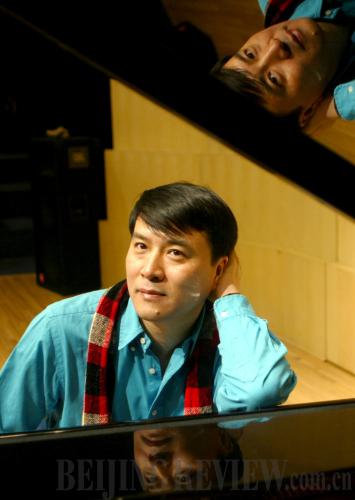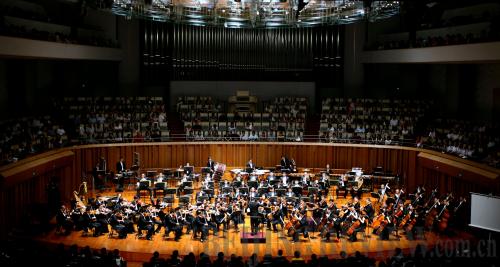|
 |
|
Ye Xiaogang (CFP) |
To the beautiful melody of China's new generation composer Zou Hang's latest work 2011, the 2011 Beijing Modern Music Festival (BMMF) lowered its curtain on May 27.
"The number of modern classical works performed during the 2011 BMMF was greater than any other music festivals of the same type in the world. And their quality was unprecedented. The 2011 China International Forum on Cultural, Fine Arts and Humanities Education during the festival was also very splendid and led to fascinating debate," said famous Chinese composer Ye Xiaogang, artistic director of the 2011 BMMF.
Since its start in 2002, the BMMF has presented the world's modern music masterpiece performances in Beijing every year in May, and invited famous musicians worldwide to discuss and probe the development of modern music and modern music education. It aims to popularize modern music, facilitate cultural communication between China and the world, and provide a good platform for young musicians.
"But today's success was not achieved overnight," said Ye.
 |
|
GRAND PERFORMANCE: The China National Symphony Orchestra performs at the closing ceremony of the 2011 BMMF on May 27 (XINHUA) |
"When I returned to China after studying music in Europe nine years ago, I thought Beijing should also have a modern music festival, as many big European cities, such as Paris and Vienna, have their own modern music festivals. That was why I proposed establishing a modern music festival in China at that time," he said.
The festival had a "simple start" because of a lack of funding. But the young festival gained support from musicians and also the Chinese Government. After nine years of development and exploration, the BMMF has increasingly become one of the world's most remarkable modern music festivals.
"This year, we invited China's five leading symphony orchestras to perform during the festival, which was unprecedented," said Ye. "Normally speaking, a contemporary music festival would often invite one symphony orchestra."
Presenting classics
The 2011 BMMF kicked off at the National Center for the Performing Arts (NCPA) in Beijing on May 21. The festival comprised exquisite concerts, a competition for young composers worldwide and master classes on campus.
This year's BMMF presented 17 high-class concerts, including five symphonic, 10 chamber, an opera and a choral concert, with sideline activities as well.
Four world-class master composers and 14 famous orchestras from home and abroad were invited. Audiences were able to enjoy a wide range of musical genres performed by world-renowned artists from the United States, Germany, Austria, Hungary, Poland and Myanmar.
The opening concert, held on May 21, included Twill by Twilight by Japanese composer Toru Takemitsu, Symphony No.5 by Georgian composer Giya Kancheli and Symphony No.3 Chu by Ye, who is also vice president of the Central Conservatory of Music.
The Symphony No.3 Chu was a blend of Western instruments with traditional Chinese ones. The tenor's flowing yet powerful voice was echoed by a symphony orchestra, resulting in a perfect musical collaboration.
On May 22, Hungarian composer Gyorgy Ligeti's Atmospheres, Thailand composer Narong Prangcharoen's Tri-Sattawat, Polish composer Witold Lutoslawski's Mourning Music for String Orchestra, Japanese composer Shinichiro Ikebe's Symphony No.5 and U.S. composer Steven Stucky's Second Concerto for Orchestra were performed by the China Philharmonic Orchestra under the baton of famous Chinese conductor Zhang Guoyong at the NCPA, bringing audience a rare auditory treat.
"Bringing these classical musical works to China is to let Chinese music lovers know the height that world modern music has achieved. It will broaden young people's vision and usher in new music culture of a new time," said Ye.
| 